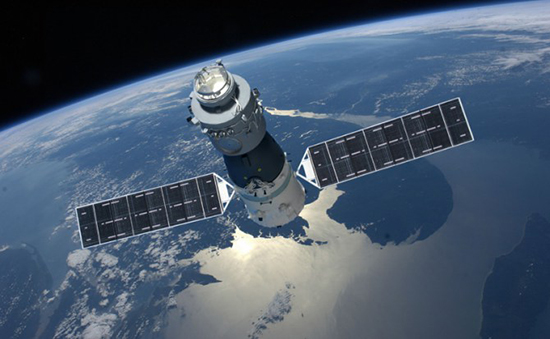


A file photo shows China's first space lab "Tiangong-1"
China has been closely watching the orbit of descending space station "Tiangong-1," which is expected to come down safely in first half of the year, according to a top Chinese aerospace engineer, denying reports that the module is out of control.
China didn't lost the control of Tiangong-1, and the country is continuously monitoring its movement, said Zhu Congpeng, a top space lab engineer at the China Aerospace Science and Technology Corporation, in an interview with China's Science and Technology Daily newspaper published on Monday.
As China's first manned space station, Tiangong-1 or "Heavenly 1" was launched into orbit in 2011 and completed three docking missions with both unmanned and manned spaceflights between 2011 and 2013.
The station will burn up when it re-enters the atmosphere, which is expected to take place in the coming months, and the remaining wreckage will land in designated waters, posing no threat to the ground, Zhu added.
After 1,630 days in space, about two and a half years longer than its designed lifespan, Tiangong-1 ended its data service in March 2016 but still remained in the designed orbit.
In late 2017, some Western media reported questions raised by some astrophysicists, who said the station's orbit has been steadily decaying and may crash back to Earth in late 2017 or early 2018, which could endanger people.
(Complied by Chen Lidan)
 Fire brigade in Shanghai holds group wedding
Fire brigade in Shanghai holds group wedding Tourists enjoy ice sculptures in Datan Town, north China
Tourists enjoy ice sculptures in Datan Town, north China Sunset scenery of Dayan Pagoda in Xi'an
Sunset scenery of Dayan Pagoda in Xi'an Tourists have fun at scenic spot in Nanlong Town, NW China
Tourists have fun at scenic spot in Nanlong Town, NW China Harbin attracts tourists by making best use of ice in winter
Harbin attracts tourists by making best use of ice in winter In pics: FIS Alpine Ski Women's World Cup Slalom
In pics: FIS Alpine Ski Women's World Cup Slalom Black-necked cranes rest at reservoir in Lhunzhub County, Lhasa
Black-necked cranes rest at reservoir in Lhunzhub County, Lhasa China's FAST telescope will be available to foreign scientists in April
China's FAST telescope will be available to foreign scientists in April "She power" plays indispensable role in poverty alleviation
"She power" plays indispensable role in poverty alleviation Top 10 world news events of People's Daily in 2020
Top 10 world news events of People's Daily in 2020 Top 10 China news events of People's Daily in 2020
Top 10 China news events of People's Daily in 2020 Top 10 media buzzwords of 2020
Top 10 media buzzwords of 2020 Year-ender:10 major tourism stories of 2020
Year-ender:10 major tourism stories of 2020 No interference in Venezuelan issues
No interference in Venezuelan issues
 Biz prepares for trade spat
Biz prepares for trade spat
 Broadcasting Continent
Broadcasting Continent Australia wins Chinese CEOs as US loses
Australia wins Chinese CEOs as US loses